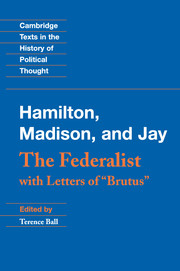Preface
Published online by Cambridge University Press: 05 June 2012
Summary
The first thing one is likely to notice when picking up The Federalist is its bulk. At nearly five hundred closely printed pages it is as long as Machiavelli's Discourses or Hobbes's Leviathan. But the appearance is deceptive, for The Federalist is not a systematic treatise in political theory. Nor are its authors armchair philosophers writing in lofty isolation from the rough-and-tumble of practical politics. The Federalist is a partisan tract. It represents one side of the first of the two most momentous debates ever conducted in America: the debate over whether to ratify or reject the newly drafted American constitution, which pitted its “Federalist” supporters against its “Antifederalist” foes, and culminated in the adoption of the Constitution of the United States. (The second great debate – over slavery and secession – divided the country and ended in civil war.) To understand the ratification debate, and indeed The Federalist itself, requires that we also attend to Antifederalist arguments against the proposed Constitution. My aim in this volume is to restate important parts of the Antifederalist case against, and The Federalist's case for, the new Constitution. This I do by reprinting in full all eighty-five Federalist papers written by the pseudonymous “Publius” (Alexander Hamilton, James Madison, and John Jay), along with the sixteen letters of “Brutus,” the prominent but still unknown New York Antifederalist who was Publius's most formidable foe.
- Type
- Chapter
- Information
- The FederalistWith Letters of Brutus, pp. xi - xiiPublisher: Cambridge University PressPrint publication year: 2003



